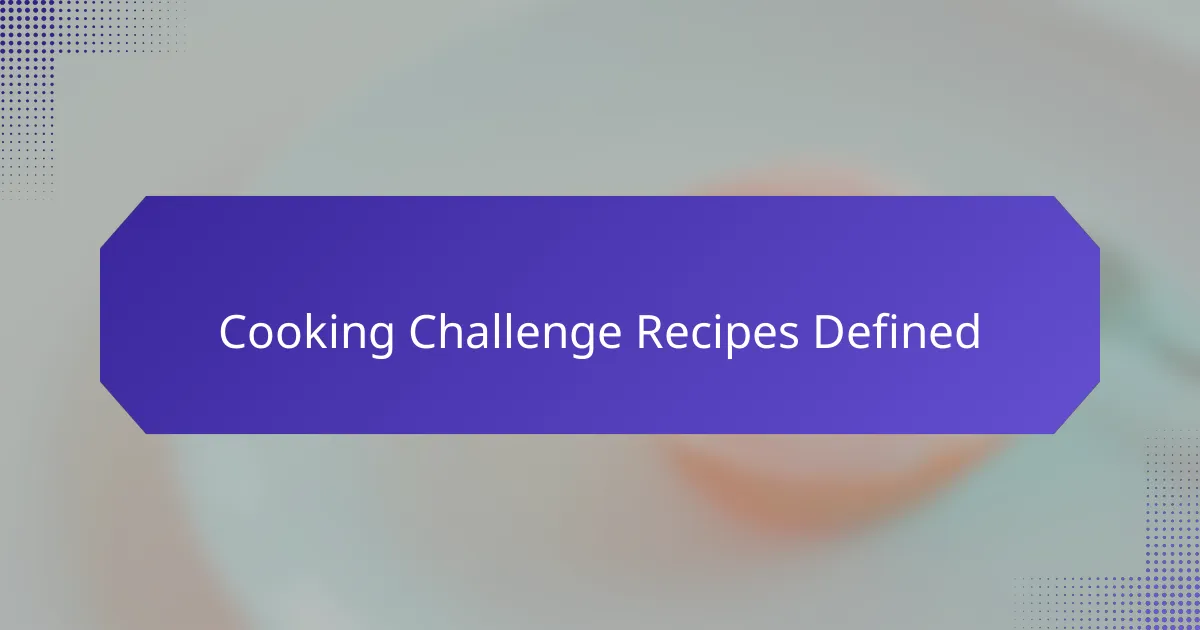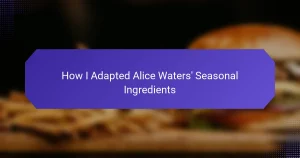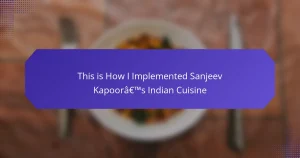Key takeaways
- Cooking challenge recipes encourage creativity and experimentation in the kitchen by pushing cooks beyond their comfort zones.
- Understanding the science of cooking enhances flavor combinations, improves techniques, and fosters creativity.
- Alton Brown’s approach combines science and humor, making cooking enjoyable and relatable while advocating for precision and quality tools.
- Personal experiences with recipes lead to deeper connections with cooking, transforming them into narratives rather than mere instructions.

Cooking Challenge Recipes Defined
Cooking challenge recipes are essentially culinary tasks designed to push cooks out of their comfort zones. They often include specific ingredients, cooking techniques, or themes, creating an element of fun and competition. I remember my first cooking challenge—it was a mystery basket event. The thrill of opening the basket to find an assortment of random ingredients was both exciting and a bit daunting.
These recipes not only test skills but also ignite creativity in the kitchen. Have you ever had to whip up a dish with items you’d never think to combine? It’s in those moments that I’ve discovered some of my favorite flavor pairings. For example, a challenge requiring me to use kale and chocolate completely shifted my perspective on how versatile ingredients can be.
In essence, cooking challenge recipes are about exploration. They encourage cooks to innovate and experiment, while also learning from failures. I’ve seen firsthand how a single recipe can lead to a whole culinary adventure, sparking joy and frustration alike in the process. It’s this journey that makes cooking not just a chore, but an exciting challenge worth embracing.

Importance of Science in Cooking
Understanding the science behind cooking has transformed how I approach my culinary endeavors. When I discovered Alton Brown’s emphasis on the chemistry of ingredients, it opened my eyes to why certain recipes succeed while others fail. It’s not just about following a recipe; it’s about understanding the whys and hows of cooking techniques that can truly elevate a dish.
As I’ve experimented in my kitchen, I’ve noticed that integrating scientific principles helps me make informed decisions. For example, grasping the Maillard reaction—the process that gives browned food its distinct flavor—has encouraged me to experiment with different cooking methods, resulting in deeper flavors and better textures. Here’s why understanding science can make such a difference:
- It helps explain how ingredients interact, leading to better flavor combinations.
- Scientific knowledge can guide proper cooking techniques, ensuring food safety.
- It enhances the ability to troubleshoot problems, like fixing a curdled sauce.
- Understanding food science can inspire creativity, encouraging unique culinary experiments.
- It fosters a deeper appreciation for the art of cooking, seeing it as both art and science.
When I cook with this knowledge in mind, I feel empowered, knowing I’m not just following steps but truly engaging with the kitchen science at play.

Overview of Alton Brown’s Approach
Alton Brown’s approach to cooking is a delightful blend of science, technique, and a bit of whimsy. He believes that understanding the “why” behind cooking processes is just as crucial as mastering the “how.” I remember the first time I watched his show; it opened my eyes to the intricacies of cooking and transformed how I viewed food preparation.
He often advocates for using the right tools and equipment, encouraging home cooks to step away from conventional methods. His fusion of culinary arts with scientific principles not only makes cooking more educational but also more enjoyable. I still cherish my copy of “Good Eats,” where his quirky explanations demystified complex techniques, turning me into a more confident cook.
- Emphasis on understanding the science behind cooking techniques.
- Use of humor and storytelling to make cooking relatable and fun.
- Advocacy for quality tools to simplify cooking processes.
- Encouragement of experimentation in the kitchen.
- Focus on accessible ingredients and methods for home cooks.

Key Techniques for Success
When I first delved into Alton Brown’s approach to science-based cooking, one technique that stood out to me was the importance of precision. Using a kitchen scale instead of measuring cups transformed my cooking experience. I noticed the difference right away—my baked goods turned out consistently better, and I felt a newfound confidence in the kitchen, as if I had unlocked a hidden door to success.
Another key technique I appreciate is understanding the role of ingredients at a molecular level. For example, learning how salt influences the texture and flavor of meat helped me produce dishes that were not just satisfying but memorable. It’s fascinating how these scientific principles elevate cooking from mere routine to an enjoyable adventure.
- Use a kitchen scale for precise measurements.
- Understand cooking methods (e.g., searing vs. braising) and their scientific impacts.
- Experiment with temperatures and times for optimal results.
- Familiarize yourself with ingredient functions (like emulsifiers in dressings).
- Practice mise en place to streamline your cooking process.

My Personal Experience with Recipes
Experimenting with recipes has been a transformative journey for me. Initially, I was hesitant to stray from classic methods, but each challenge pushed me to take a leap of faith. I remember a particular incident where I attempted a savory dessert for a cooking challenge. Bringing together unexpected flavors not only surprised my palate but also opened my mind to the endless possibilities in cooking.
As I’ve explored different recipes, I’ve found that each one teaches me something unique. For instance, last summer, I tackled a complicated soufflé. At first, it seemed intimidating, but the process was a thrilling mix of science and art. I realized that if I paid close attention to the temperature and timing, I could achieve that perfect rise, and the taste was absolutely delightful. Have you had those moments where you felt like a culinary scientist in your kitchen?
Through these personalized explorations, I’ve developed a deeper connection with my recipes. They aren’t just lists of ingredients but rather stories waiting to be crafted. Whether it’s adopting Alton Brown’s techniques or improvising based on what’s in my pantry, each cooking session feels like following a thread through a wonderful tapestry of flavors and experiences.

Favorite Recipes Inspired by Alton Brown
One of my favorite recipes inspired by Alton Brown is his infamous roasted Brussels sprouts. I remember the first time I made them—I was skeptical because I thought I didn’t like Brussels sprouts. But following Alton’s technique of roasting them at high heat changed everything. The caramelized edges brought out a nutty sweetness that had me craving more.
Another phenomenal recipe I can’t get enough of is his homemade pizza dough. It’s a game changer! Using a food scale for precise measurements, as Alton suggests, really elevates the dough’s texture. I recall how proud I felt the first time I pulled a perfectly baked homemade pizza out of the oven, the aroma filling my kitchen and making it feel like a pizzeria.
Here are some of my favorite recipes inspired by Alton Brown:
- Roasted Brussels Sprouts: High-heat roasting to enhance sweetness.
- Homemade Pizza Dough: Precision in measurement for perfect texture.
- Baked Macaroni and Cheese: His combo of cheeses creates a creamy masterpiece.
- Chicken Pot Pie: The use of a good roux brings everything together beautifully.
- Salt-brined Turkey: An essential tip for a juicy Thanksgiving turkey.


